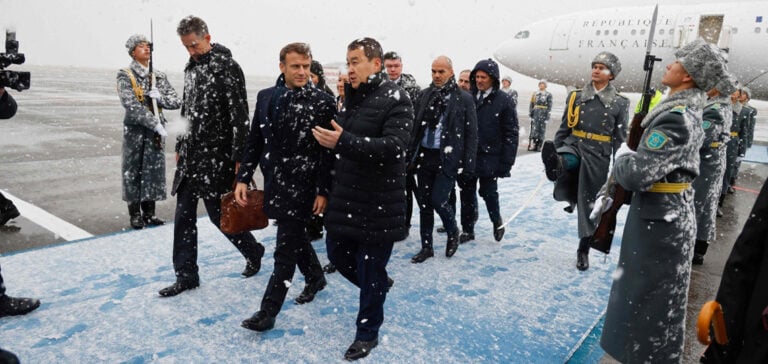During his visit to Kazakhstan, French President Emmanuel Macron called for a strengthening of the “strategic partnership” between France and Kazakhstan. The visit comes against a backdrop of power struggles in Central Asia, and Mr. Macron stressed the importance of this relationship with resource-rich Kazakhstan.
Speech in Astana
In his speech in Astana, the Kazakh capital, President Macron hailed Kazakhstan’s “refusal” to bow to pressure from certain major powers and become a vassal. He stressed that France regards Kazakhstan with respect and friendship, at a time when Russia’s traditional influence in Central Asia is being challenged by China, the European Union and Turkey.
Importance of the median corridor
Emmanuel Macron also spoke of the importance of developing a “median corridor across the Caspian Sea” to link Europe and Central Asia, offering an alternative to Chinese and Russian logistics routes in this landlocked region.
French Economic Delegation
In addition to political discussions, the visit was marked by the presence of a large French business delegation, including the CEOs of EDF, Suez and Orano. Several contracts have been signed in the strategic minerals, pharmaceutical, energy, industrial and cultural sectors. In addition, the supply of GM 400 military radars manufactured by Thalès was announced, reinforcing Kazakhstan’s sovereignty.
France as an investor
France is the fifth-largest foreign investor in Kazakhstan, largely due to the presence of the TotalEnergies oil group, which jointly operates a major Kachagan field in the Caspian Sea. Bilateral trade reached 5.3 billion euros in 2022, mainly in hydrocarbons. What’s more, Kazakhstan supplies almost 40% of the uranium used in France.
Critical metals and economic openness
Critical metals, essential to the energy transition and of which the region is rich, also figure prominently in discussions with Uzbekistan, which is one of France’s main suppliers of uranium. Uranium specialist Orano, which already operates a mine in Kazakhstan, is also looking to expand its presence, as Kazakhstan alone produces 43% of total output, according to the World Nuclear Association. Central Asia, long a Russian pre-square, is being ardently courted by the major powers at a time when Russia is preoccupied with its military offensive in Ukraine.
In this game of influences, neighboring China, with its major infrastructure project of the “New Silk Roads”, has taken a head start. But Europe and Turkey are also advancing their positions, as Turkish President Recep Tayyip Erdogan will be in Astana on Friday. Buoyed by this enthusiasm, Kazakhstan and Uzbekistan are banking on economic openness and balanced diplomacy to assert themselves, even if Moscow remains an essential partner.
Kremlin spokesman Dmitry Peskov said on Wednesday that Kazakhstan was a “sovereign country developing its diplomatic relations as it sees fit”. Despite their economic openness, Kazakhstan and Uzbekistan remain authoritarian regimes where the repression of demonstrations is often violent, despite a declared desire for political liberalization.






















